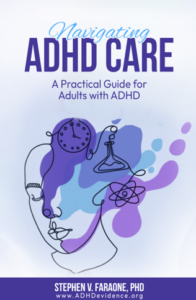Support www.ADHDevidence.org and learn about quality measures for the diagnosis and treatment of ADHD.
Information on obtaining Dr. Faraone’s book about Quality Measures for ADHD can be accessed on this link: https://amzn.to/41AlCJx
Mission statement:
To educate the public and health professionals about ADHD in Adults
- Evidence-based information
- Fact, not rumors
- Learn with us here, online
This website provides the viewer with evidence-based information and data that are facts, not rumors. We invite you to learn with us online and encourage you to click on the many educational resources provided throughout this website.
Welcome message from ADHD expert and web content advisor:

Stephen F. Faraone, PhD
Distinguished Professor and Vice Chair of Research of Psychiatry and Behavioral Sciences
Professor of Neuroscience and Physiology Professor of Neuroscience Graduate Program
Department of Psychiatry, SUNY Upstate Medical University
Syracuse, NY
“Welcome to the ADHDinAdults website. I am honored to be part of this educational experience.
The content in this site provides viewers with up-to-date data and information that is evidence-based and has been selected for inclusion and developed by clinicians for clinicians.
Initially developed as a resource for healthcare professionals, the website is open to patients and others who share an interest in ADHD in adults. We encourage non-clinicians to share information learned on this site with their healthcare providers for discussion on current and future ADHD management decisions.”
What is ADHD?
ADHD in Adults is a legitimate diagnosis. It begins in childhood typically by the teenage years, and two-thirds of ADHD children grow into ADHD adults. ADHD is very typically accompanied by other conditions such as anxiety, depression, substance use disorder, bipolar disorder, sleep problems, and a number of other diagnoses. The presence of these diagnoses should alert primary care professionals to screen for the presence of ADHD, which can be an underlying contributor to patient complaints. There are 18 well-recognized symptoms of ADHD, the count of which can determine if a person is one of three types — hyperactive, inattentive, or combined.
The most effective treatment for ADHD today is ADHD medication, from which there is a variety to choose — both stimulants and non-stimulants. While exercise, other psychological approaches and alternative modalities can have positive effects on ADHD symptoms, ADHD medications have been shown by research to have the most predictable and largest effect size in reducing symptoms of ADHD.
Due to century-old assumptions about the disorder disappearing after childhood, adults with ADHD and their primary care doctors are today beginning to understand the disorder and what can be done about it, safely and effectively. No longer just a disorder in children and adolescents, ADHDinAdults.com has up-to-date, evidence-based, accredited CME and non-CME programs for healthcare professionals, developed and presented by experts in the field.

Adult ADHD Recognition Timeline
1990s:
First studies of stimulants in adults published
1993: The Wender Utah Rating Scale utilized in adults
1994: DSM-IV acknowledges adult ADHD as a valid disorder
2000s:
Prevalence of adult ADHD was published
November 2002: Strattera is the first medication to be approved for ADHD in adults
August 2004: Adderall XR is first stimulant medication approved for ADHD in Adults
2005: The Adult ADHD Self-Report Scale (ASRS) is validated
2010s:
2013: DSM-V updates definition of ADHD to include and characterize the disorder in adults
2020s:
2023: Adult ADHD as a search term on PubMed identifies 1,469 citations
Statistics on ADHD Diagnosis in Adults
The worldwide estimated prevalence of persistent adult ADHD, defined as those who had childhood onset and continue to have ADHD symptoms as an adult, is 2.6%, affecting nearly 140 million adults globally.
The estimated prevalence of symptomatic adult ADHD, regardless of childhood onset, is 6.8%, affecting 366 million adults.
ADHD in adults carries a tremendous economic burden to society; based on recent estimates, the excess cost to society in 2018 was $122.8 billion ($14,092 per adult) including unemployment, productivity loss, and healthcare services.
References:
1. Song P, Zha M, Yang Q, et al. The prevalence of adult attention-deficit hyperactivity disorder: A glob systematic review and meta-analysis. J Glob Health. 2021;11:04009.
2. Schein J, Adler LA, Childress A, et al. Economic burden of attention-deficit/hyperactivity disorder among adults in the United States: a societal perspective. J Manag Care Spec Pharm. 2022;28(2):16
APSARD is a multi-disciplinary organization dedicated to enhancing outcomes for individuals with ADHD and their families by fostering lifespan research on ADHD and sharing evidence-based practices and education.
With a diverse Board comprising global experts in psychiatry, epidemiology, ethics, coaching, psychology, advanced-practice nursing, and pediatrics, APSARD collaborates with ADHD patient organizations to increase public awareness, reduce stigma, and facilitate constructive dialogue between healthcare professionals and patients.
We encourage healthcare professionals interested in ADHD and related disorders to visit APSARD’s site and benefit by becoming members of this important society.


